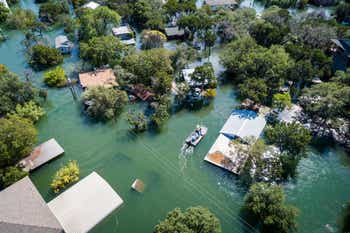Heat waves, droughts, floods, earthquakes, wildfires, tornadoes and hurricanes torment Americans every year. During 2020 the U.S. experienced 22 weather and climate-related disaster events, at least 10 of which caused at least a billion dollars of damage, according to the National Oceanic and Atmospheric Administration.
Not everyone can pack up and move to Michigan – one of the states with the fewest occurrences of natural disasters – but there are steps you can take to prepare and protect your home in the event a natural disaster strikes.
Scenario: Your home is located in a flood zone.
- First and foremost, make sure you have flood insurance because standard homeowners and renters insurance policies usually don’t cover flooding. Flood insurance policies are available through the National Flood Insurance Program and typically have a 30-day waiting period from the date of purchase before they go into effect.
- Elevate furnaces, water heaters and electrical components (switches, sockets, circuit breakers, and wiring) at least 12 inches above your home’s projected flood elevation and make sure they’re secured to a solid structure.
- Anchor any fuel tanks.
- Consider constructing barriers to prevent water from entering the building, as well as sealing basement walls with waterproofing compounds.
- Locate the main power switch for utilities, as well as the main gas valve, in case you need to disconnect and close them during a storm.
Scenario: The area where you live is subject to hurricanes.
- Learn the elevation level of your property and whether the land is prone to flooding to help determine if your home will be affected during a storm surge or tidal flooding. If flooding is a concern, as in the scenario above, be sure you have flood insurance.
- Install storm shutters or laminated glass with impact-resistant glazing to protect windows during a storm. An alternative is to board up windows with plywood once a storm is predicted.
- Make sure trees and shrubs on your property are well-trimmed to make them more wind-resistant.
- Have a generator on-site in case of power outage.
- Note what outdoor furniture, decorations and other miscellaneous items would need to be brought indoors before a storm.
- Reinforce your garage doors to mitigate potentially dangerous and expensive structural damage.
- Locate the main power switch for utilities, as well as the main gas valve, in case you need to disconnect and close them during a storm.
- Clear gutters and downspouts of debris.
Scenario: A tornado might form.
There are more than 1,000 tornadoes a year, on average, in the U.S.
- Learn the difference between a tornado watch and a tornado warning.
- Prepare for high winds by removing diseased and damaged limbs from trees.
- Identify a safe room within your home where family members should gather during a storm. Ideally, this is a basement, storm cellar or interior room on the ground floor with no windows.
- Secure or move indoors any outdoor items that may become projectiles, like furniture, potted plants and trash cans.
Scenario: Hot, dry conditions may spark a wildfire.
- Plant fire-resistant plants and shrubs.
- Install fire-resistant roofing materials.
- Regularly clean your roof and gutters and mow the lawn, clearing away clippings and dry twigs immediately.
- Keep garden hoses attached to faucets to aid fire personnel.
- Set aside household items like rakes, axes, saws, buckets and shovels that can be used as fire tools.
- Consider installing protective shutters or heavy, fire-resistant drapes.
- Mercury Insurance offers additional tips to help plan ahead and protect your home in the event of a wildfire.
- Install screens over attic vents with a mesh size of 1/8 inch.
Scenario: An earthquake might occur.
- Fasten shelves securely to walls and make sure large or heavy items are stored on lower shelves.
- Secure heavy items to walls (pictures and mirrors) away from beds and areas where people sit.
- Hire a professional to repair defective wiring and leaky gas connections. Also seek professional help to look for signs of structural damage and to repair deep cracks in ceilings and the foundation.
- Locate safe spots in each room under a sturdy table or against an inside wall.
- Keep a wrench near your main gas valve and learn how to turn it off.
- Secure water heaters, furnaces, gas appliances and furniture by bolting them to wall studs.
- Install cabinet latches to prevent them from opening and spilling contents, such as dishes and glassware.
Before any type of disaster strikes, you should also have an emergency plan in place for your family that includes a designated meeting place, emergency contact numbers and evacuation plan. Practice your plan at least twice a year to keep it fresh in everyone’s minds and make adjustments as needed. And if you have a pet, incorporate them into your evacuation plan, too.
You should also have an emergency kit that is easily accessible and includes basic survival items.
- One gallon of water per person
- Non-perishable food
- Battery-powered or hand-crank radio (and extra batteries)
- Flashlight
- First-aid kit
- Whistle to signal for help
- Can opener
- Blankets
- Wrench or pliers to turn off utilities
- Portable charging station for cell phones
FEMA recommends keeping three-day supplies of food and water for each family member.
Consider packing prescription medications, glasses, important financial documents, copies of insurance policies (and your agent’s contact information), a recent copy of your household inventory, birth certificates, social security cards and other identification in a portable waterproof container. It’s also a good idea to include $500 cash in small bills since ATMs and credit card processing units may be inaccessible during a power outage.
If you’re affected by a natural disaster, Mercury Insurance recommends taking the following steps to facilitate the claims process:
When filing a claim.
- Contact your insurance provider immediately to report a loss.
- Be prepared to provide your policy number.
- Do not remove debris or damaged property that may be related to your claim.
Steps after filing a claim.
- Prepare a detailed inventory of destroyed or damaged property.
- Offer photos or videotapes of your home and possessions to your adjuster, if these are available.
- Keep copies of communications between you and your adjuster.
- Keep records and receipts for additional living expenses that were incurred if you were forced to leave your home and provide copies to your adjuster.
Ready.gov, FEMA and the American Red Cross offer additional tips for protecting your home and family before, during and after a disaster.


